 Many are taught that "The Ten Commandments" are ten simple "thou shalt nots" that spell out how to live your life, written by God himself on tablets of stone. But, in addition to the Commandments having little to do with our lives and modern sense of ethics, there are other problems and confusions that occur concerning the commandments when you examine the text of the Bible. There are more than ten commandments, first of all. There are hundreds. And it's difficult to say which ones, if any, were written on stone. The Bible does eventually give us a list of ten commandments, but they are not the popular ones we sorta kinda think we know. There is much to sort through and discuss concerning this topic, so we'll walk through it slowly.
Many are taught that "The Ten Commandments" are ten simple "thou shalt nots" that spell out how to live your life, written by God himself on tablets of stone. But, in addition to the Commandments having little to do with our lives and modern sense of ethics, there are other problems and confusions that occur concerning the commandments when you examine the text of the Bible. There are more than ten commandments, first of all. There are hundreds. And it's difficult to say which ones, if any, were written on stone. The Bible does eventually give us a list of ten commandments, but they are not the popular ones we sorta kinda think we know. There is much to sort through and discuss concerning this topic, so we'll walk through it slowly.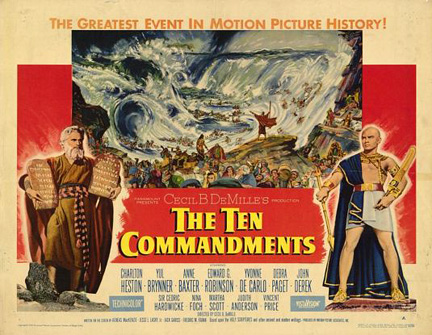
It begins simply enough. God allows Moses' people to escape slavery by bringing ten plagues upon Egypt and then killing their pursuers in the Red Sea. Moses makes it to Mount Sinai, where God comes down in the form of fire. Moses' company is instructed not to touch the mountain or get too close or they'll die. There's lots of thunder and trumpet blasts. It's all very Wizard of Oz, and it sometimes seems as if Moses is just making things up, saying that the words are from God, and asking everyone not to pay attention to that man behind the curtain. But, of course, we're supposed to imagine that God himself really is saying and doing these things, so that's what we'll do.
At this point God begins to instruct the people, giving what are commonly known as "The Ten Commandments," even though the book doesn't call them that here and I'm not so sure they add up to ten. They are as follows, with commentary by me. Since I've heard over and over that the Ten Commandments are the basis of many contemporary laws, including those of the United States, I'll discuss them in relation to the current laws of our country. Penalties for breaking these commandments are also worth noting, so I'll list those. If you want to read along with me in your preferred translation (I'm, as usual, using the New Revised Standard Version), you can find "The Ten" in Exodus 20. They appear again, slightly modified, in Deuteronomy 5.
ONE. "I am the Lord your God, who brought you out of the land of Egypt, out of the house of slavery; you shall have no other gods before me."
The Talmud suggests that the "prologue" before the semi-colon is actually the first commandment. Seems like more of a statement to me. Most everyone else takes this whole sentence as the first.
What we notice, right away I hope, is that this commandment has nothing to do with contemporary readers. This is a commandment written specifically for Moses' people, since they were the only ones who were brought out of the land of Egypt by God. I guess the idea is that Jews are descendants of Moses' people and that Christians and Muslims are "spiritual" descendants and therefore must follow this rule? I'm not sure, but it seems that most of the Laws of Moses are just that: laws created exclusively for those following Moses. The laws probably became irrelevant sooner rather than later.
The phrase "gods before me" could imply at least two things. One is that there is only one god and that anyone worshipping other gods is worshipping deities that don't exist. This, I imagine, is the common interpretation for believers, since it supports monotheism. The other implication, and the more likely one within the context of the Exodus story, is that multiple gods do exist and God wants to be #1. (We see more of this idea in the second commandment.) So either God wants to be the main god (allowing you to have others as long as he's most important) or (more probably) he wants the others ignored completely. Where Jesus, a human-god hybrid, fits into this commandment for Christians, I'm not sure (unless you think that Jesus is God, which is its own conundrum).
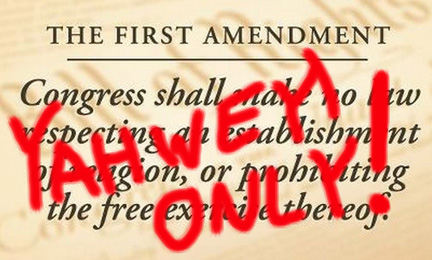 A more symbolic reading of this could be that God wants himself placed above other "gods," such as the god of money or war or football. "God" could also be symbolic in this sense. But I think these commandments are meant to be taken literally as practical laws, and so I won't spend much time reading them symbolically in order to make some kind of contemporary or spiritual sense out of them, unless such a reading seems relevant.
A more symbolic reading of this could be that God wants himself placed above other "gods," such as the god of money or war or football. "God" could also be symbolic in this sense. But I think these commandments are meant to be taken literally as practical laws, and so I won't spend much time reading them symbolically in order to make some kind of contemporary or spiritual sense out of them, unless such a reading seems relevant.As a basis for current United States law, this commandment is of course nonsense. We'd have to throw away the Establishment Clause of the First Amendment, for starters (which would be fine with some people, of course).
Penalty if broken: Stoned to death. Possibly genocide of entire people who worship other gods (since God did command this a few times).
Have I broken this one? No, I went from believing in only God (unless you count Jesus and the Holy Ghost and angels and devils) to believing in zero gods, so I think I'm safe. "Thou shalt not be an atheist" is not a commandment and perhaps didn't occur to anyone.
TWO. "You shall not make for yourself an idol, whether in the form of anything that is in heaven above, or that is on the earth beneath, or that is in the water under the earth. You shall not bow down to worship them; for I the Lord your God am a jealous God, punishing children for the iniquity of parents, to the third and fourth generation of those who reject me, but showing steadfast love to the thousandth generation of those who love me and keep my commandments."
St. Augustine and the Catholic Catechism treat this as a continuation of the first commandment, since it has to do with other gods. Most take this as number two.
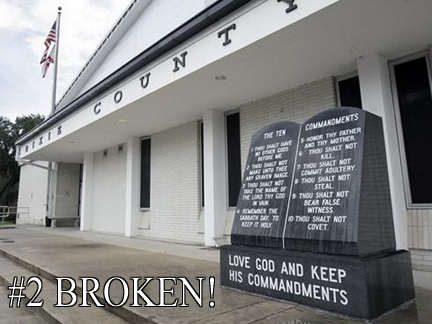 We assume "idol" here means little statuettes of other gods. But, based on the weird language, it could just as easily mean anything artistic: any kind of sculpture or painting or whatever. This commandment could also, of course, prohibit artistic renderings of God himself, or Jesus, or angels. Thank goodness no one seems to interpret it this way, else we'd have missed out on some great art over the past few thousand years. (Although it would certainly solve the problem of government officials who, ironically, want idols of the Ten Commandments in their government buildings.) My best guess is that these idols refer to the "other gods" of commandment one. It probably specifically refers to nature gods, since it uses that language. The Hebrew god was an attempt to create a deity that existed outside of nature (whatever that means), a way to separate himself from the more useful gods who represent the actual world.
We assume "idol" here means little statuettes of other gods. But, based on the weird language, it could just as easily mean anything artistic: any kind of sculpture or painting or whatever. This commandment could also, of course, prohibit artistic renderings of God himself, or Jesus, or angels. Thank goodness no one seems to interpret it this way, else we'd have missed out on some great art over the past few thousand years. (Although it would certainly solve the problem of government officials who, ironically, want idols of the Ten Commandments in their government buildings.) My best guess is that these idols refer to the "other gods" of commandment one. It probably specifically refers to nature gods, since it uses that language. The Hebrew god was an attempt to create a deity that existed outside of nature (whatever that means), a way to separate himself from the more useful gods who represent the actual world.This one specifies why God doesn't want us having other gods before him or making idols: he's jealous. This gives evidence that other gods do exist. If they don't, then God is jealous of imaginary deities. We also learn that God punishes "to the third and fourth generation" those who reject him and love "to the thousandth generation" those who love him. I assume the "thousandth" thing is hyperbole, but "third and fourth" sounds pretty literal. Either way, I'm not sure how this could work.
Because let's say my parents love God, so therefore God will show me love and my daughter love (and 998 more generations down). But if I reject God, then my daughter (and her kids) don't get the love but they get punished? What trumps what: my parents' love of God or my rejection of him? It makes you think that it might be easier to simply let each person be punished or rewarded based on his own merit!
Like the First Commandment, this has nothing to do with contemporary American law (go look at all the monuments and statues in Washington D.C. if you don't believe me), so those who think the Ten Commandments are the basis of our modern laws are 0-2 so far.
Penalty if broken: Death. Possibly genocide of entire people who make idols. Again.
Have I broken this one? I make art all the time, and I've made crosses and other icons, and I've drawn pictures of Jesus or whatever, but I've never made a god statue and bowed down to it. I have a fertility idol in my house, but I didn't make it and I don't worship (or believe in) it. I'm considering making a little butterfly garden in my back yard and maybe scattering little gods and angels and Buddhas and things throughout it. I'll call it the Commandment Two Defiance Garden.
THREE. "You shall not make wrongful use of the name of the Lord your God, for the Lord will not acquit anyone who misuses his name."
Once again, I have to make guesses as to what this means. The NRSV says "make wrongful use." A common translation is "take in vain." A one word translation is "blaspheme." My best guess is that God didn't want people using the "power" of his name when making oaths, such as is done with oaths like "I swear on my mother's grave" or "I swear on the life of my children." "I swear by God himself" isn't something God would like. Or, as we often still say, "I swear to God." Another idea is that you're doing something evil "in the name of God," such as being a minister or some other kind of representative but misusing this power.
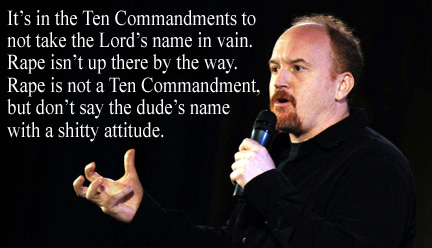 We're not even sure what his name is. "Yahweh," I guess, but that just means "I am," which was his way of saying he didn't have a name. "God," surely, is not his real name, even in translation, since that's just a generic term for a deity. It would be like my name being Man (which, by the way, was Adam's name, more or less, when properly translated).
We're not even sure what his name is. "Yahweh," I guess, but that just means "I am," which was his way of saying he didn't have a name. "God," surely, is not his real name, even in translation, since that's just a generic term for a deity. It would be like my name being Man (which, by the way, was Adam's name, more or less, when properly translated).Some say that curses like "God damn it!" or "Jesus Christ!" is breaking this commandment. Perhaps saying "Thank God" or "God knows" or "God bless you" could get you in trouble. Or screaming his name out during sex. Many folks are so worried about this one, in all its ambiguity, that they won't say the word "God" aloud at all and they'll write it in print as "G-d," just to play it safe.
And no wonder, because the penalty itself is somewhat built into this commandment: "the Lord will not acquit anyone who misuses his name." The penalty is the usual, being stoned to death, but it's even more severe for someone who believes in the afterlife because God never forgives you. This commandment, then, must be the same as (or at least similar to) the concept of blaspheming the Holy Ghost (in the New Testament), the only unforgivable sin, which brings about eternal damnation. So, apparently, using God's name in a wrong way is worse than pretty much anything you can do in this life.
No use in modern American law, of course (0-3). In fact, the president, congress, and everyone else can't seem to stop saying God's name in speeches, writing it on coins (which I'm pretty sure would fall under "wrongful use"), invoking it in public school prayers, and otherwise using it for their own political purposes.
Have I broken this one? Almost certainly. I've sworn by God, I've cursed using his name, I've used it casually ("God knows," etc.), I've called him an asshole, and -- hey -- look at this: "I deny the Holy Ghost, goddamn it!" I'm already beyond hope of acquittal, so why not?
FOUR. "Remember the sabbath day, and keep it holy. Six days shall you labor and do all your work. But the seventh day is a sabbath to the Lord your God; you shall not do any work--you, your son or your daughter, your male or female slave, your livestock, or the alien resident in your towns. For in six days the Lord made heaven and earth, the sea, and all that is in them, but rested the seventh day; therefore the Lord blessed the sabbath day and consecrated it."
I don't know what it means for God to "rest" on the seventh day. It's not like he went back to work on the eighth, right? Anyway, we're not sure if the sabbath is Saturday or Sunday (it depends on who you ask), so some folks sin once a week while others don't, depending on who is right. Of course, God might be liberal enough to let us pick whatever day of the week we like.
 While I suppose it's a good idea to have a day off, it seems like observing the sabbath causes more work and less relaxation. Jesus later said that the sabbath was made for man, not man for the sabbath, so he was annoyed with its inconvenience as well.
While I suppose it's a good idea to have a day off, it seems like observing the sabbath causes more work and less relaxation. Jesus later said that the sabbath was made for man, not man for the sabbath, so he was annoyed with its inconvenience as well.But did you notice something weird about this commandment? When God is clarifying who shouldn't work on this day, he includes (in addition to things that probably don't pertain to you like livestock and "the alien resident in your towns"), your slaves! Not to give anything away, but "thou shalt not buy and sell people" is not a commandment. Instead, slaves are casually mentioned several times as something you probably own. (I wonder if slaves in America were given the day off by the good Christian slave-owners who used the Bible to defend this peculiar institution.)
We're up to the fourth commandment and still we haven't found one that forms the basis for US law (0-4). Imagine if we tried to enforce a day off work. We're so used to everyone working all the time that we pay special attention when Chick-fil-A snootily takes Sunday off.
Penalty if broken: Stoned to death. (This is getting redundant.) My favorite example of this punishment is the guy who was gathering sticks one sabbath. Moses and company weren't sure what to do with him, I guess thinking that gathering sticks didn't exactly seem like work, so they asked God's advice. God himself demanded that he be stoned to death. I would be afraid to even pull the lever on my La-Z Boy. Resting is such dangerous, difficult work!
Have I broken this one? Yes, and so has ever preacher who goes to work on Sunday.
FIVE. "Honor your father and your mother, so that your days may be long in the land that the Lord is giving you."
I guess? Who knows what this means? Show them respect? Obey them no matter what? Give them cards on Mother's and Father's Day? Anyway, it's the first commandment that has anything much to do with human beings, since everything so far has been about keeping God happy (except maybe the last one, which is possibly for humans, even if it's more about celebrating that time that God had a vacation). It's the least objectionable so far, though I can imagine it being abused by shitty parents.
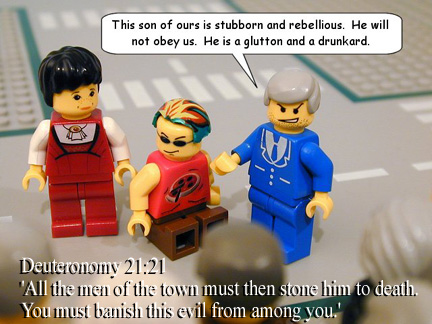 Once again, this is another one created only for Moses' people, since it refers specifically to "the land that the Lord is giving you."
Once again, this is another one created only for Moses' people, since it refers specifically to "the land that the Lord is giving you."Useless in modern law (0-5, halfway there). If anything, our country puts more emphasis on parents honoring children.
Penalty if broken: Death again, folks (which explains why your days won't be long). And the parents are often the ones who get to decide if their kids deserve this death or not, taking a "stubborn and rebellious son" to the elders if their usual disciplinary measures don't work. This punishment goes against our most fundamental sense of morality and even our biological programming. Why are we supposed to respect a law that forces parents to kill their children?
Have I broken this one? I can't think of anything I've ever done that would be considered "dishonorable" by my parents, though I've been doing things that go against their wishes since the day I was born. Who doesn't? "Kids these days..."
(And, hey, while this writing isn't exactly meant to be a God-bashing document, I would like to spell this out: if you believe in the version of God recorded in the Bible, he -- once upon a time, even if it was just for this "chosen" people of his -- commanded that parents murder their children by getting the town to hurl rocks at their brains until they die an unimaginably painful and confusing death. Think about this fact in the quiet of the night, right before you pray that God watch and protect your little ones.)
SIX. "You shall not murder."
As soon as Moses brings down the tablets from the mountain, he sees his people breaking Commandment Two by worshipping a golden cow. In anger, Moses then gathers a group of his favorite followers (the sons of Levi) and says to them, "Each of you kill your brother, your friend, and your neighbor," which they do, killing three thousand of their own people. (God follows this massacre up with a plague, just for good measure.)
My point is that "You shall not murder" isn't as clear-cut as one would imagine. And, what with all the required stonings we've been talking about, I like to think of this as "The Ironic Commandment." I can't really read it without laughing.
 Of course, today we generally say that murder is wrong, and yet we murder, so the concept is not too clear-cut for us either. Murder is sometimes okay if during wartime, or for self-defense, or if you're executing someone who has committed a heinous crime (usually murder), if you think blowing up people will get you into paradise, if you think your lawyers can help you get away with it, if you're a super-genius serial killer who has a code-riddled scheme to teach society a lesson, or if your dog tells you to do it during an especially warm summer.
Of course, today we generally say that murder is wrong, and yet we murder, so the concept is not too clear-cut for us either. Murder is sometimes okay if during wartime, or for self-defense, or if you're executing someone who has committed a heinous crime (usually murder), if you think blowing up people will get you into paradise, if you think your lawyers can help you get away with it, if you're a super-genius serial killer who has a code-riddled scheme to teach society a lesson, or if your dog tells you to do it during an especially warm summer.This is one of the short laws (they get shorter once they begin applying to humans), so it's pretty non-specific. We assume it applies only to humans (especially since animals are always being sacrificed). We might assume it applies only to Moses' people (though, again, he couldn't follow it for five minutes, and God wanted even more murder).
The Jainists, an Eastern religion that obviously doesn't follow these commandments, do much better than the Abrahamic religions with this one. They try not to murder anything, wearing masks so they won't accidentally eat bugs, sweeping little soft brooms in front of them so as not to step on them, eating only a few grains of rice a day--more or less killing themselves in the process, of course. (Suicide, by the way, is not specifically outlawed in the Ten Commandments, though this one may cover it.)
This is the first commandment that is also a contemporary secular law, though to suggest that no one ever thought of "do not kill" before The Ten Commandments were written is silly. The Code of Hammurabi was about a thousand years earlier than The Ten, and that code (of course) wasn't the first time the bright idea appeared either. All social animals figure out pretty quickly that one can't just go around murdering everyone without serious consequences, and one doesn't need a belief in God to realize it. (One does, often, need a belief in God to justify murder.) But, yes, it reflects modern law, so we're 1-5 now.
Penalty if broken: Lifetime in prison. Just kidding. It's death. (Prison is never an option in Moses' law.)
Have I ever broken this one? I've never killed a person, no. My brother convinced me to kill a bird once as a child (a mockingbird, no less; a state bird, no less) and I felt like shit afterward, so that's about the biggest animal I've ever killed. I've killed many bugs, flies, spiders, etc., though I try to avoid even that as much as possible these days.
SEVEN. "You shall not commit adultery."
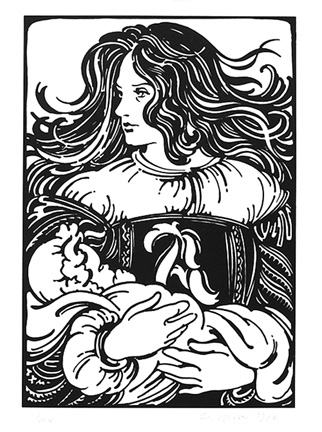 "Adultery" here apparently means sleeping with another man's wife, since men in the Bible were allowed to have concubines, other wives, prostitutes, female slaves, rape-able spoils of war, etc. A man couldn't sleep with another man's wife because it was the other man's property and therefore a kind of sexual theft. But as long as he owned the woman (usually bought from the previous owner, the father), he could do what he wanted with as many as he wanted. So a single man could sleep with another man's wife and be an adulterer, which isn't really how we think of the word now.
"Adultery" here apparently means sleeping with another man's wife, since men in the Bible were allowed to have concubines, other wives, prostitutes, female slaves, rape-able spoils of war, etc. A man couldn't sleep with another man's wife because it was the other man's property and therefore a kind of sexual theft. But as long as he owned the woman (usually bought from the previous owner, the father), he could do what he wanted with as many as he wanted. So a single man could sleep with another man's wife and be an adulterer, which isn't really how we think of the word now.So it's not the good-rule-of-thumb, semi-moralistic commandment it at first appears to be. It has little to do with a monogamous ideal. God obviously doesn't promote monogamy in the Hebrew Bible, and the New Testament (confirmed bachelors Jesus and Paul) seems to support no marriage at all, with marriage as a last resort for the super-horny. So much for "traditional," Biblical marriage being between one man and one woman.
Today, adultery is a mild crime in less than half of the states in the USA, though it's not much enforced and is usually a misdemeanor. Even in my rather religious and conservative state of Alabama, it's not considered adultery unless you're actually living with the person as well as sleeping with them, and then it's a Class B misdemeanor. Most adultery laws are fading from the books. But I'm feeling generous, so I'll say the score is 2-5, since this commandment has some connection to contemporary law.
Penalty if broken: The adulterer and the piece of property (the wife caught in the act) are killed.
Have I ever broken this one? Nay verily. Although Jesus had some more strict interpretations of the word adultery, such as not allowing a divorced woman to sleep with a man (he considered her still married) or the famous one about committing adultery by "lusting in your heart" when you even look at a married woman with desire, so God would say no, but Jesus (and Jimmy Carter) would say yes.
EIGHT. "You shall not steal."
 Some Biblical scholars think that the better translation is "You shall not kidnap." Indeed, kidnapping is the only case of theft that requires a death penalty (the only penalty so far in the Ten), and since people were often property (slaves, wives), this theory makes sense.
Some Biblical scholars think that the better translation is "You shall not kidnap." Indeed, kidnapping is the only case of theft that requires a death penalty (the only penalty so far in the Ten), and since people were often property (slaves, wives), this theory makes sense.For non-people theft, penalties vary, depending on the situation. For example, if someone steals an ox, then slaughters or sells it, the thief has to pay five oxen for the one ox stolen. If the thief can't pay it, he's sold into slavery. (There's that word again.) If the ox is still alive, he will only pay two oxen. It is permissible to kill a thief breaking into your house during the night, but if you kill a thief doing so in the day, then it is considered murder.
Most of the punishments, relative to the other commandments, seem almost reasonable. This is also a common sense humanity-based commandment that still applies in modern law. Like the other humanity-based commandments, however, laws against theft would exist no matter if the Bible was ever written or not. But since we're keeping score, we're now 3-5, catching up.
Have I ever broken this one? I've never taken anyone else's physical items, no. I am guilty of using Napster back in the early 2000s, but Moses could have hardly predicted that situation.
NINE. "You shall not bear false witness against your neighbor."
 With the exception of the "your neighbor" phrase (anyone in the world? others in Moses' camp? your actual neighborhood neighbor?), this one is pretty straightforward. Do not say that someone has done or said something that they haven't done or said. This is an especially important law in relation to the rest of the Ten, since a false accusation could result in the death penalty for the one accused.
With the exception of the "your neighbor" phrase (anyone in the world? others in Moses' camp? your actual neighborhood neighbor?), this one is pretty straightforward. Do not say that someone has done or said something that they haven't done or said. This is an especially important law in relation to the rest of the Ten, since a false accusation could result in the death penalty for the one accused.Slander and libel are part of our law (4-5), and the explanations the Bible gives for how to deal with these issues sound nearly like a judicial system, with the potential false accuser coming before priests and judges (and the Lord himself, apparently) who will make an inquiry. If the accusation is found to be false, then he'll be punished according to what he accuses the person of doing. For example, if he falsely accuses someone of murder, and is found to be lying, then he himself receives the punishment for murder. Okay, it's a little goofy, but it's better than most of the above punishments.
Have I ever broken this one? Not that I can remember. Almost certainly not as an adult. When we were children, my sister told Mom "he hit me" a lot when I hadn't, but I've since forgiven her for breaking Commandment Nine.
TEN. "You shall not covet your neighbor's house; you shall not covet your neighbor's wife, or female or female slave, or ox, or donkey, or anything that belongs to your neighbor."
In order to force-fit all the above commandments to the number ten, some (including Augustine) split this one in two, making "You shall not covet your neighbor's wife" as its own. Adultery is so bad, I suppose, that this one was thought to be its own commandment, as if to say, "Don't even think of sleeping with someone else's wife." Or: "You even dream about having sex with my wife, you better wake up expecting a stoning."
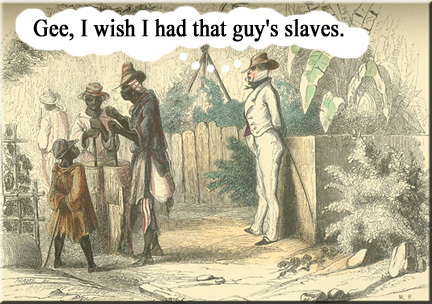 This is the only commandment that is about thought (coveting), not about doing. This one doesn't seem to have a punishment, so I guess it's preventative medicine against the ones that do (adultery, theft). This commandment also takes Jesus' eventual route, preventing you from even thinking of doing bad things. Jesus, for all of his softness compared to the angry Hebrew God stuff, was a lot more hard when it came to putting things into practice. Don't lust in your heart, do not be angry with your brother, love your enemies as yourself, let people beat you up, let them steal your stuff and give them more when they do, give all of your money away, despise your family if they don't allow you to do God's work, bring every thought into subjection, etc. At least the Ten Commandments are possible to follow. Jesus' laws are not, which I why I suppose so much emphasis is put on grace and forgiveness. (Note the circular trap every Christian finds himself in. It is impossible not to sin, so the business of forgiving sins is a lucrative one.)
This is the only commandment that is about thought (coveting), not about doing. This one doesn't seem to have a punishment, so I guess it's preventative medicine against the ones that do (adultery, theft). This commandment also takes Jesus' eventual route, preventing you from even thinking of doing bad things. Jesus, for all of his softness compared to the angry Hebrew God stuff, was a lot more hard when it came to putting things into practice. Don't lust in your heart, do not be angry with your brother, love your enemies as yourself, let people beat you up, let them steal your stuff and give them more when they do, give all of your money away, despise your family if they don't allow you to do God's work, bring every thought into subjection, etc. At least the Ten Commandments are possible to follow. Jesus' laws are not, which I why I suppose so much emphasis is put on grace and forgiveness. (Note the circular trap every Christian finds himself in. It is impossible not to sin, so the business of forgiving sins is a lucrative one.)While a human being may be able to detect your coveting something, it would be difficult to prove. However, if you believe that God can read your mind, then the Tenth Commandment can actually come into play. If you find yourself, even for a split second, wishing you had that guy's riding lawnmower, you're breaking a commandment and God knows it. And there's nowhere to run and hide inside your brain.
It's not against US law to want other people's stuff, and -- in fact -- wanting other people's stuff is part of the "American Dream." So the final tally is 4-6. Only four-ish commandments have anything to do with secular, contemporary American law, and none of those (murder, adultery, theft, false witness) quite fit the contemporary definition, spirit, or practice of these laws, certainly not concerning punishment. So let's not hear any more of that bullshit talk.
Have I ever broken the "thou shalt not covet" commandment? Sure. I'm probably doing it right now. Although I can say for certain that I've never coveted anyone's ox, donkey, or slave (male or female). I guess I just never wanted those things.
Here's where everything becomes different from what I (and many others) was taught. After this "tenth" commandment is given, at the end of Exodus 20, the people become scared of God's light show on the mountain, thinking they will be killed by God's power. So, in fear, they ask Moses to stick around and listen to the rest of the commandments by himself so that they can get out of there. (If the Wizard of Oz theory is true, this would be especially handy for Moses, who could just make up what he wanted to tell them without even having to tinker behind the curtain.)
After everyone leaves, God gives Moses his "eleventh" commandment, which concerns proper altar-making. Then the "twelfth" commandment concerning slaves (a commandment well worth reading if you're interested in God's ideas about people-owning). He just keeps going, for ten more chapters. (There are 613 commandments, more or less, spread out over the rest of the Torah.) So the "Ten Commandments," if anything, should be called "The First Ten Commandments." I guess they're like the Bill of Rights.
It's true that many of the rest of the commandments are further explanations of the first ten (which is where I got most of the information about punishments), but you could say the same about many within the first ten. (Jesus summed them all up as "Love God above all" and "Treat others as you want to be treated.") So we get new laws and clarifications about violence, property, theft, bearing false witness, the sabbath and the sabbatical year, annual festivals for God (in which he demonstrates that he's very picky about the kind of food he likes to eat), and more. Moses goes back later and gets additional instructions about the tabernacle, the ark of the covenant, and other priest-and-ritual stuff (stuff that really doesn't apply to modern society).
This is when the golden calf incident happens and Moses slaughters his own people. God, by the way, was prepared to kill all of them (not merely three thousand) and "make a great nation" of Moses (kind of like Noah Part II), but Moses talked him out of it. (God is so jealous, please note, that he is threatened by a cow statue.) Moses himself was so mad when he saw the cow that he broke the two tablets that the covenant was written on. But what was on those stone tablets? Was it the ten that we just examined? Was it the entire set of hundreds of commandments? Something else? Let's look further.
Eventually God lets Moses return with two more stone tablets so that he can "write on the tablets the words that were on the former tablets, which you broke." But what we get are not the "Ten Commandments" we just looked at. We get something else completely. And at the end of God telling Moses this brand new (but apparently same) set of commandments, the narrator of Exodus (34) says, "And he wrote on the tablets the words of the covenant, the ten commandments" (italics mine), the first time this phrase actually appears. (The same wording occurs in the recap in Deuteronomy 10.)
The so-called "Ten Commandments" we just examined, and that everyone thinks they kinda sorta know, are not even the Ten Commandments!
So I'm calling the commandments on the new set of tablets the Real Ten Commandments, even though they are traditionally called the "Ritual Commandments." (Sometimes the ones we just looked at are called the "Ethical Commandments.") Tradition decided that the first ten were "The Ten," but tradition got it wrong. Tradition often gets the Bible wrong, and it's amazing when you sit down and read the actual goddamned words how much tradition gets it wrong. It's even more amazing how the power of tradition can cloud your mind even while reading the actual text, so that tradition changes what is in front of your eyes.
So what are the Real Ten Commandments? Brace yourself.
ONE. "See, I will drive out before you the Amorites, the Canaanites, the Hittites, the Perizzites, the Hivites, and the Jebusites. Take care not to make a covenant with the inhabitants of the land to which you are going, or it will become a snare among you. You shall tear down their altars, break their pillars, and cut down their sacred poles (for you shall worship no other god, because the Lord, whose name is Jealous, is a jealous God). You shall not make a covenant with the inhabitants of the land, for when they prostitute themselves to their gods and sacrifice to their gods, someone among them will invite you, and you will eat of the sacrifice. And you will take wives from among their daughters for your sons, and their daughters who prostitute themselves to their gods will make your sons also prostitute themselves to their gods."
This commandment somewhat parallels Commandment One of the "Ethical Commandments" we discussed earlier, but it's a lot more specific about nationalities, icons, etc. It also parallels the ten-plus commandments we discussed earlier (the "eleventh," "twelfth," etc.), commonly known as the "Large Covenant Code."
If it is debatable whether the "Ethical Commandments" were intended for Moses' people only or for everyone who considers themselves members of an Abrahamic religion (Jews, Christians, Muslims, Mormons, etc.), then it should be pretty clear that the actual ("Ritual") Ten Commandments are only for Moses and company. Oh, I suppose you could be very symbolic about it if you like, allowing God to clear out the "spiritual" Amorites, Canaanites, Hittites, Perizzites, Hivites, and Jebusites from within your inner self. In fact, this is what the church I grew up in suggested, attempting to make applicable to the modern day Christian what amounted to the useless (and of course invented) history of the Bible. Our ministers referred to them as your inner "Ites."
But, of course, this is really just God giving the command to never be diplomatic. What's interesting about most ancient nations is that, whenever a people were conquered, they would adopt the bits of their religion and culture that they enjoyed and add and combine those elements with their own, sometimes throwing their own out in favor of the new. (The spoils of war, therefore, included gods and goddesses.) But the Hebrews said "Fuck all that." They were complete iconoclasts. This world ain't big enough for the host of us, only Sheriff Yahweh.
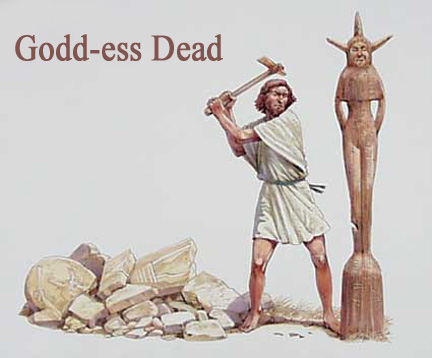 The "sacred poles" mentioned in this commandment refers to "Asherah Poles" or "Asherim," which are either wooden poles, actual trees, or perhaps carved statues of the goddess Asherah, the "Queen of Heaven," the female consort of God (and female equivalent of his power) that the Hebrews wanted to (perhaps literally) root out. There was only room for one god, and he had to have a penis, so the age of the goddess was over. If our mythology feels lacking, it is. Fifty percent of it, the female aspect, was destroyed by these xenophobic writers. And, since as go the gods so go humans, actual women suffered (and continue to suffer) as well. It is not an exaggeration to say that, because of commandments like these, Western culture is a lopsided, limping lobotomy case.
The "sacred poles" mentioned in this commandment refers to "Asherah Poles" or "Asherim," which are either wooden poles, actual trees, or perhaps carved statues of the goddess Asherah, the "Queen of Heaven," the female consort of God (and female equivalent of his power) that the Hebrews wanted to (perhaps literally) root out. There was only room for one god, and he had to have a penis, so the age of the goddess was over. If our mythology feels lacking, it is. Fifty percent of it, the female aspect, was destroyed by these xenophobic writers. And, since as go the gods so go humans, actual women suffered (and continue to suffer) as well. It is not an exaggeration to say that, because of commandments like these, Western culture is a lopsided, limping lobotomy case.I won't go through the punishments for breaking the real commandments, since it's pretty much the usual (death, etc.). I also, for obvious reasons, won't bother figuring out whether they influence current American laws (hint: they don't). However, I will note that some politicians and political voices are attempting to follow this first commandment in our country: to eliminate any religion that isn't the one they like, their preferred religion being, of course, Sufism. I'm just kidding, folks: it's Christianity.
Have I ever broken this one? Although I said "no" for the earlier Commandment One (about other gods), for this one I'm saying "yes." I am interested in many religions, including their diverse icons and symbols, and I enjoy many different gods and goddesses. And, although I attack pretty much all religions eventually, the attack is usually for the larger purpose of preserving religious freedom: living and letting live. If I attack Christianity more than any other religion, it's because it is the largest current group that attempts to destroy other forms of the sacred. This is true in America anyway: Islam probably wins the intolerance title worldwide.
TWO. "You shall not make cast idols."
A parallel of Commandment Two, but less wordy. Again, I've never made idols, but people who sell crosses do.
THREE. "You shall keep the festival of unleavened bread. Seven days you shall eat unleavened bread, as I commanded you, at the time appointed in the month of Abib; for in the month of Abib you came out from Egypt."
A parallel from the "Large Covenant Code" I glossed over earlier, the part about annual festivities held for God, almost word for word. I've never followed this commandment because I never can remember when Abib is.
FOUR. "All that first opens the womb is mine, all your male livestock, the firstborn of cow and sheep. The firstborn of a donkey you shall redeem with a lamb, or if you will not redeem it you shall break its neck."
In which God reveals himself to be Rumpelstiltskin, wanting firstborns for some reason, which I suppose explains why he doesn't like anyone saying his name. What does a god need with all of this shit? Or does he just not like us having it?
Have I ever broken this one? No, I've never owned livestock.
FIVE. "All the firstborn of your sons you shall redeem. No one shall appear before me empty-handed."
 In the same way that you can "redeem" a firstborn donkey that you'd like to keep by sacrificing a lamb instead (or breaking its neck), you can also redeem a firstborn son (with, probably, a lamb, or maybe another animal). This prevents you from having to actually kill your firstborn son, but -- as God says -- "No one shall appear before me empty-handed."
In the same way that you can "redeem" a firstborn donkey that you'd like to keep by sacrificing a lamb instead (or breaking its neck), you can also redeem a firstborn son (with, probably, a lamb, or maybe another animal). This prevents you from having to actually kill your firstborn son, but -- as God says -- "No one shall appear before me empty-handed."This obviously leads to the Jesus story in which Jesus becomes the ultimate "redeemer" for everyone, the first son ("only begotten") of God himself, becoming the "Lamb of God" who is killed to compensate for God's bloodlust. Of course, some interpretations say that Jesus is God, which means that God became the human Jesus who became a symbolic lamb who was sacrificed (on the cross) for the sake of the celestial version of himself. I dunno. Even if it makes sense symbolically, it doesn't make any practical sense, and -- unfortunately -- Christianity is running off the assumption that it makes some sort of genuine sense that Jesus dying did some economical magic trick for us on behalf of the mafia god who wants his cut.
So the theory behind the crucifixion of Jesus goes back to this scapegoat commandment and others like it, where one thing can be sacrificed for another. Apparently the cosmos just works this way, though no one has been able to really explain to me why. An old gospel song we used to sing puts it this way: "He paid a debt he did not owe. I owed a debt I could not pay. I needed someone to wash my sins away [with sacrificial blood drained for an angry god]... Christ Jesus paid a debt that I could never pay." (But, hey, do you want to hear a secret? Lean in. You don't actually owe anything! I give you your freedom! Rejoice!)
If Jesus existed, it seems that he was someone who was sick to death of all these stupid laws and wanted to do away with them once and for all, even if it meant arranging his own death. This is probably what he meant when he said he came to fulfill the law, not destroy it. "You need to kill animals to atone for sins? Fine, I'm the son of God himself, and I'll be the ultimate scapegoat for everyone. Oh, and you're forgiven. Now get on with your lives!" If Jesus didn't exist (or only existed in part), then it seems that the writers of the "new" testament were trying to get this idea across by creating this character. It partially worked, in that animal sacrifices no longer occur, but now Christians have to sacrifice themselves to the scapegoat, which seems to have defeated the purpose.
Have I ever broken this one? No, I've only had a daughter, a nearly useless human being in God's eyes.
SIX. "Six days you shall work, but on the seventh day you shall rest; even in plowing time and in harvest time you shall rest."
This is parallel to the Fourth Ethical Commandment. It also is expanded in the Large Covenant Code, which says "so that your ox and your donkey may have relief, and your homeborn slave and the resident alien may be refreshed."
I've already told you I've broken this one--the spirit of it anyway, since I've never owned oxen, donkeys, or slaves (not yet anyway).
SEVEN. "You shall observe the festival of weeks, the first fruits of wheat harvest, and the festival of ingathering at the turn of the year. Three times in the year all your males shall appear before the Lord God, the God of Israel. For I will cast out nations before you, and enlarge your borders; no one shall covet your land when you go up to appear before the Lord your God three times in the year."
A less specific version of this is found in the Large Covenant Code. I admit to never having attended any of these festivals, even when I was at my most religious. This is apparently why I don't own much land.
EIGHT. "You shall not offer the blood of my sacrifice with leaven, and the sacrifice of the festival of the passover shall not be left until the morning."
Found in the Large Covenant Code. Passover stuff. I've never done a passover. I just hunt Easter Eggs: unleavened ones.
NINE. "The best of the first fruits of your ground you shall bring to the house of the Lord your God."
Found in the Large Covenant Code. God enjoys the fruit and vegetable group as well as the meat group. I've broken this commandment, since I have grown fruits before and ate them myself. Forgive me. They were delicious: so sweet and so cold.
TEN. "You shall not boil a kid in its mother’s milk."
Last and possibly least! Found in the Large Covenant Code. Boiling a young goat in its mother's milk and then performing a ritual with it is something some of the "competing" polytheistic religions did. As we learned from Commandment One, God doesn't like other religions, so many things considered "evil" by God were (and are) really just things that other religions practiced, no matter how harmless. This is why you can frighten certain Christians by calling something they own "pagan," maybe suggesting that their Christmas tree is a Asherah Pole or pointing out occult-looking symbols on their Procter and Gamble products. Even Satan's look was inspired by innocent-enough goat gods, a successful attempt to literally demonize other religious practices. So that's why the tenth and final commandment that God saw fit to re-record on stone tablets was this one about seething a tiny goat in its mother's milk.
I've never broken this commandment, but it sounds like fun.
Even if you believe that this commandment-giving story actually happened, I don't see that it matters too much which commandments God wrote on stone and which ones he didn't. It seems like the commandments themselves would matter, not the format they were presented in.
More importantly, the commandments don't apply to you; they were given to Moses for specific purposes that God had in mind for those people in that situation. I'm willing to believe that perhaps there was some really good reason for following those crazy laws that we now just don't understand, or that perhaps what seems barbaric now was the best they (and therefore God) could do at the time. ("An eye for an eye," for example, is better than "Revenge for my eye! Kill everyone!") Baby steps.
If you find that some of these laws still apply to modern morality and law (such as "don't murder"), then it's only because those are the kinds of things you'd expect to find in any society at any time, large or small. If you find that most of them feel irrelevant or confusing, then this should make perfect sense.
For Christians who feel that Jesus wiped out the entire "old" testament with his death, I suppose it's okay if you think that as long as you're not digging around in these wiped-out laws to support your beliefs concerning modern society. (I'm looking at you, gay-bashers!) I do think, if nothing else, that the "new" testament makes no sense without the "old" (and barely then), so I wouldn't use this theory as an excuse to not read your own holy book on which you are supposedly basing your most important life decisions.
Since archeology has demonstrated that there was never an exodus out of Egypt and since I'm pretty sure Moses never existed, these commandments have about as much relevance to my life as the rules of Fight Club, so I've -- in part -- written this analysis to have fun with it, much like someone who tries to figure out which circle of Hell Dante would place him in. However, like many religious matters, other people's beliefs about the Ten Commandments do affect me and the country I live in, so I wanted to share some thoughts about them that might put them in a more proper context. I know similar things have been done all across the internet and elsewhere, but not as thoroughly and entertainingly as I've done them here, you'll have to admit.
Oh, and I almost forgot! God has revealed to me (through an email attachment) a redux of his Ethical Ten Commandments. I hope you find them as surprising and refreshing as I did. Here they are.

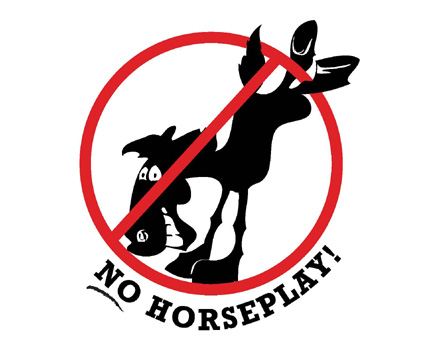
No comments:
Post a Comment